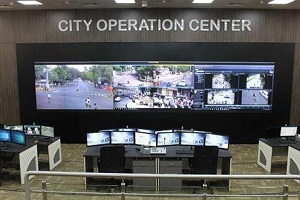With the city of Nagpur needing to enhance its road safety even as it was expanding, Videonetics designed a solution based on its Intelligent Traffic Management System that provides continuous monitoring of the traffic situation, records traffic violations at intersections, and triggers necessary penal action against violators. Videonetics has supported Nagpur in achieving the Smart City status, under the Smart City Mission of Government of India, by securing its roads with an AI & DL powered Intelligent Traffic Management Solution.
Today, the city has ANPR and RLVD systems spread across 120 traffic junctions, to track and record licence plate of any type of vehicle, as well as detect red light or stop line violation at intersections. Nearly 1,300 IP cameras have been deployed, to monitor vehicle movement and detect suspect vehicles simultaneously.
In addition, Videonetics’s Integrated e-Challan/e-Ticket Management Software has been assimilated with Regional Transport Office database, to fetch the details of a vehicle and its owner. Once a violation is detected, an e-challan is issued to the offender. The e-challan also maintains a record of all payments, both received and pending.
Importantly, the solution provides the police a bird’s eye view of the traffic junctions and city’s roads, from the Command & Control Centre. From the unified interface, security operators can view, manage real-time alerts and respond to them swiftly.
Prior to the installation of Videonetics’s Smart City solution, Nagpur city relied on on-site traffic monitors / police to catch offending vehicles. However, the recent implementation of the solution has eliminated the need for physical deployment of traffic police at each junction. Videonetics’s solution helps maintain security on the city’s roads by detecting and recording traffic violations with accuracy, resulting in irrefutable evidence for local authorities. In addition, citizens have started obeying traffic rules, resulting in an over 50% reduction in traffic violations.
The open architecture of the solution not only allows the city to continue adding more applications to make its traffic management more robust, but also integrate with the city surveillance system in a single unified interface, to address security concerns with a holistic approach








